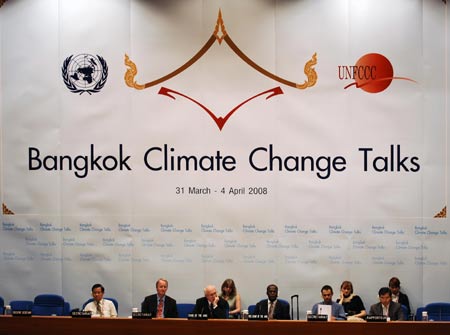Bangkok Climate Change Talks ended after midnight Friday after delegates agreed on a work plan for future negotiations which aim to yield a new pact on global cooperation in combating climate change after 2012.

Bangkok Climate Change Talks ended after midnight Friday after delegates from developed countries and developing countries agreed on a work plan for future negotiations leading to a new pact on global cooperation action to climate change after 2012.
Before the delivery of the work plan at the closing plenary session Friday, developing countries held fierce debate and finally rejected Japan's "sectoral approach" which accusedly attempted to replace the national binding emissions cut imposed on developed countries under Kyoto Protocol with targets counted on the basis of industries and sectors in both developed and developing countries.
Talks within the two ad hoc working groups -- one on further commitments for Annex-I Parties (a group of developed countries) under Kyoto Protocol (KP group), and the other on Long-term Cooperative Action under the United Nations Framework on Climate Change Convention (UNFCCC) (LCA group), had respective focuses on what the developed countries must do (for KP group) and what the developing countries could do under a new agreement on climate change mitigation and adaptation (for LCA group).
The KP group ended its final session earlier on Friday night, with parties analyzing technologies and methods available for developed countries to meet further emission cut commitments after the first commitment period of Kyoto Protocol 2008-2012 expires.
The key and tough issue of setting binding emission cut targets in the post-Kyoto pact for the so-called Annex 1 Parties to the Convention, or developed countries as more commonly understood, is left for future discussions after the real negotiation process starts at the end of this year.